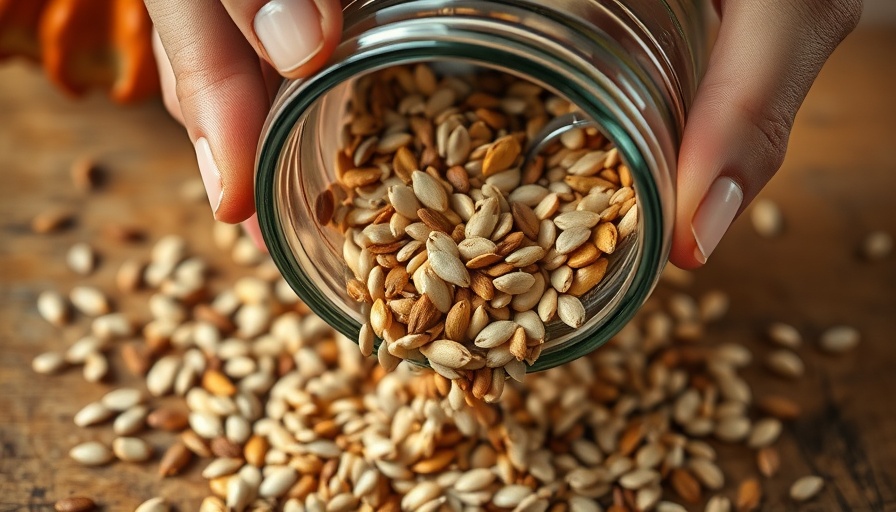
Discover the Nutritional Powerhouses: Healthiest Seeds for Your Diet
In the realm of nutrition, seeds are often overlooked, yet they possess immense benefits that can enhance your health without breaking the bank. Adding seeds to your meals not only upgrades their nutritional profile but also adds delightful textures and flavours. Let's delve into the seven healthiest seeds you should incorporate into your breakfast, lunch, and dinner.
Chia Seeds: The Fibre Queen
Chia seeds have earned their reputation as the queen of seeds, and rightly so. With just two tablespoons, you gain almost 10 grams of fibre and 4.7 grams of protein, alongside essential omega-3 fatty acids. Nutritionists commend chia seeds for their ability to promote feelings of fullness, making them an ideal breakfast companion. A 2017 study revealed that individuals who consumed chia seeds with yoghurt reported feeling satiated throughout the day. Sprinkle a spoonful into your breakfast yogurt for sustained energy and fullness until lunchtime.
Pumpkin Seeds: The Affordable Nutrient Boost
Pumpkin seeds, or pepitas, are not just a crunchy snack; they are an affordable source of healthy fats, zinc, and magnesium. A mere 50 grams of these seeds offers a remarkable 15 grams of protein. Notably high in magnesium, research indicates that this mineral plays a significant role in regulating neurotransmitters that aid sleep. Incorporating pumpkin seeds into your porridge can help lower blood sugar levels and improve blood pressure, as highlighted by studies in 2018 and 2019.
Flax Seeds: The Heart-Healthy Choice
Once considered a relic of health food stores, flax seeds now shine in the spotlight as a superfood. They're rich in thiamine—a vital B vitamin—and omega-3 fatty acids, both of which contribute to heart health. A tablespoon packs a healthy dose of soluble and insoluble fibre, promoting good gut health and preventing constipation. Their ability to reduce inflammation and fat accumulation in arteries supports their designation as a daily dietary staple.
Sunflower Seeds: A Versatile Treat
Sunflower seeds are not only affordable but also incredibly versatile. They make a perfect addition to salads, smoothies, or as a snack. These tiny seeds are a fantastic source of vitamin E, which acts as a powerful antioxidant, helping protect your cells from damage. A handful can provide essential nutrients to your body, helping to improve overall health while being easy to add to any meal.
Sesame Seeds: A Calcium-Rich Option
Sesame seeds, often found in Asian dishes, are a wonderful source of calcium and are packed with healthy fats. Just a tablespoon serves up to 90 mg of calcium, which is essential for bone health. The lignans in sesame seeds may also lower cholesterol levels and promote heart health. Incorporate them into dressings, baked goods, or sprinkle them over vegetables to reap the benefits.
Hemp Seeds: Full of Protein and Omega-3s
Hemp seeds are another nutritional powerhouse, offering a perfect balance of omega-3 and omega-6 fatty acids along with a rich supply of plant-based protein. Just three tablespoons provide about 10 grams of protein, making them an ideal choice for vegans and vegetarians seeking to boost their protein intake. Their nutty flavour individuals to sprinkle them over salads or mix them into smoothies.
Quinoa: Not Just for Salads
Though often considered a grain, quinoa is more accurately a seed. It is a complete protein source, containing all nine essential amino acids, which is incredibly rare in plant foods. This makes quinoa an excellent protein provider for those following a plant-based diet. It's also high in fibre and minerals like magnesium and iron. Consider substituting it for rice or pasta in your meals for an added boost.
Incorporating seeds into your meals is a simple yet effective strategy for enhancing not only nutrition but overall wellness. Their rich textures and diverse tastes mean you can enjoy experimenting with different seeds across various dishes.
Why Should You Implement Seeds into Your Daily Routine?
The benefits of seeds extend far beyond their nutritional content. Regularly including seeds in your diet can lead to improved gut health, enhanced satiety, and better overall physical condition. Moreover, the anti-inflammatory properties inherent in many seeds can support recovery from exercise and daily wear and tear.
As you assess your dietary habits, consider incorporating these seven healthiest seeds into your meals. From enhancing your breakfast with chia to adding crunch with pumpkin seeds in your lunch, there's no wrong way to enjoy these nutrient-dense little gems. Experiment, enjoy, and discover a new appreciation for the power of seeds!
 Add Row
Add Row 

 Add Element
Add Element 


Write A Comment